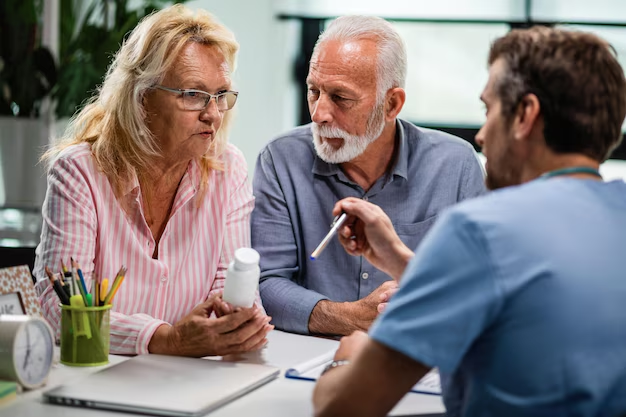Your Guide to How Do You Treat Parkinson's Disease
What You Get:
Free Guide
Free, helpful information about Parkinsons FAQ and related How Do You Treat Parkinson's Disease topics.
Helpful Information
Get clear and easy-to-understand details about How Do You Treat Parkinson's Disease topics and resources.
Personalized Offers
Answer a few optional questions to receive offers or information related to Parkinsons FAQ. The survey is optional and not required to access your free guide.
Effective Strategies for Managing Parkinson's Disease
When confronted with a Parkinson's disease diagnosis, navigating treatment options can feel overwhelming. However, understanding the available strategies can empower individuals and families to take proactive steps. Parkinson's disease, a progressive nervous system disorder, primarily affects movement. The symptoms can be managed through medications, therapies, and lifestyle adaptations, all designed to enhance quality of life.
Medications: The First Line of Defense
Dopaminergic medications are the cornerstone of Parkinson's treatment, aiming to replenish dopamine levels or mimic its action in the brain. Levodopa, often combined with carbidopa, is the most effective medication for controlling bradykinesia and rigidity. Other medications like dopamine agonists and MAO-B inhibitors are typically used in combination for more comprehensive symptom control. It's essential to work closely with a neurologist to tailor the medication regimen to the individual’s needs, adjusting as the disease progresses.
Physical and Occupational Therapy
Incorporating physical therapy can significantly improve mobility and flexibility, while occupational therapy focuses on daily living activities. Therapists offer customized exercises that target specific concerns, ultimately enhancing independence and safety. Voice and speech therapy can also be beneficial, as Parkinson's can affect vocal cords.
Surgical Options: Deep Brain Stimulation
For those not responding well to medications, Deep Brain Stimulation (DBS) is a viable option. This surgical treatment involves implanting a device that sends electrical impulses to brain areas involved in motor function. DBS can reduce tremors and improve medication responsiveness, offering relief to patients with advanced symptoms.
Lifestyle Adaptations
An active lifestyle, combined with a nutritious diet, plays a vital role in managing Parkinson's. Regular exercise not only aids in symptom management but also boosts mood and cognitive function. Strength training, stretching, and activities like tai chi or yoga can enhance balance and coordination. Staying connected with support groups and mental health professionals is equally important for emotional health.
Beyond Medical Treatment: Financial Support and Resources
Navigating the financial implications of Parkinson's disease can be daunting, but there are several government and nonprofit programs offering assistance:
- Medicare and Medicaid provide substantial support for medical and prescription expenses.
- Social Security Disability Insurance (SSDI) can offer income for those unable to work.
- Parkinson’s-specific grants are available, covering everything from medical needs to home modifications.
Exploring options such as financial planning services can help manage costs effectively. Financial advisors specializing in healthcare planning can guide families in creating sustainable budgets, ensuring they are fully utilizing available assistance.
Practical Financial Tools for Patients and Families
🎗️ Government Health Programs: Medicaid, Medicare
💵 Disability Insurance: SSDI benefits for eligible individuals
🏡 Home Adaptation Assistance: Grants for modifications to accommodate mobility
📚 Educational Grants: Support for families seeking extra skills or shifts in employment
💳 Credit Solutions: Low-interest loans for medical expenses
🔑 Financial Planning Services: Tailored advice for long-term financial health
Arming oneself with knowledge not only better equips you in managing the symptoms of Parkinson's but also provides a roadmap to secure the necessary financial and emotional support. Remember, you’re not alone in this journey. Reach out, tap into resources, and take each step with a network of support by your side.
What You Get:
Free Parkinsons FAQ Guide
Free, helpful information about How Do You Treat Parkinson's Disease and related resources.

Helpful Information
Get clear, easy-to-understand details about How Do You Treat Parkinson's Disease topics.

Optional Personalized Offers
Answer a few optional questions to see offers or information related to Parkinsons FAQ. Participation is not required to get your free guide.


Discover More
- Are There Environmental Causes Of Parkinsons
- Can Alcohol Cause Parkinson's
- Can Concussions Cause Parkinson's
- Can Concussions Cause Parkinson's Disease
- Can Dogs Get Parkinson's Disease
- Can Dogs Get Parkinsons
- Can Dogs Have Parkinson's
- Can Dogs Have Parkinson's Disease
- Can Females Get Parkinson Disease
- Can Head Trauma Cause Parkinson's
